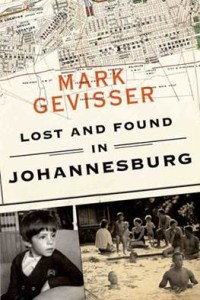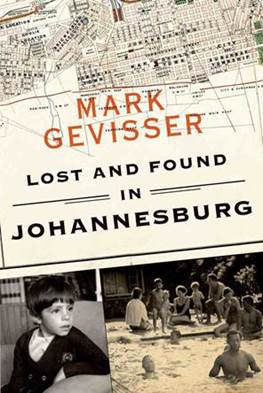 Lost and Found in Johannesburg: A Memoir
Lost and Found in Johannesburg: A Memoir
by Mark Gevisser
Farrar, Straus and Giroux. 353 pages, $27.
GROWING UP in South Africa, journalist Mark Gevisser (b. 1964) was obsessed with maps: in particular, an archaic book of streets and neighborhoods that helped him play a pretend game with himself. It was only many years later that Gevisser realized that segments of his home town of Johannesburg—specifically the neighborhoods in which the city’s poverty-stricken black population lived—were missing from the book.
Though his Jewish ancestors had endured discrimination when they immigrated to South Africa a century ago, Gevisser was born into a life of privilege and was mostly insulated from that other Johannesburg. And yet, his family had black servants that lived, by law, in small houses behind the main home. As he matured, it dawned on Gevisser that the racial system in “Joburg” was wrong. Years ago, he had known adults who ignored Apartheid laws and regularly invited blacks and whites to the same social functions. With the world’s focus on Nelson Mandela, Apartheid was losing its hold on South Africa, too, and Gevisser—who had become a world traveler and had attended Yale University—was bothered by childhood memories of the injustice that he had witnessed.
Today, Gevisser lives in Johannesburg, a city that’s surprisingly progressive on issues of sexuality. He’s married to a man he calls “C” who is of Indian descent. He’s the author of an award-winning 2008 biography of South Africa’s second president, Thabo Mbeki, and co-editor of a book titled Defiant Desire: Gay and Lesbian Lives in South Africa (1995).
One would think that those factors—an award-winning journalist and biographer, a white, Jewish, gay writer married to a man of a different race in a country that only quite recently abandoned Apartheid—would make for a fascinating memoir. Instead, the book takes eighty-some pages to delineate in excruciating detail the streets and neighborhoods of Johannesburg as they existed decades ago, not to mention a litany of Gevisser’s immigrant ancestors. There follows an olio of tales about life as a gay South African, brief accounts of racism under Apartheid, and a lengthy but breathless tale of a robbery. These are actually welcome digressions from cartography and ancestry, but they’re often buried between passages about esoteric literature and obscure South Africans of yore, and the reader may feel more lost than found in Johannesburg.
________________________________________________________
Terri Schlichenmeyer is a freelance writer based in Wisconsin.





